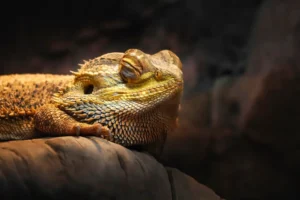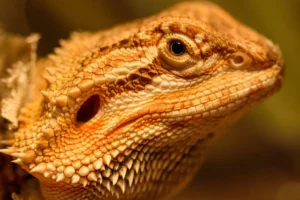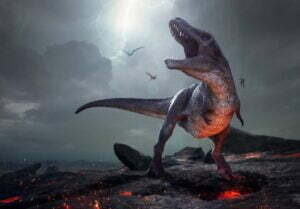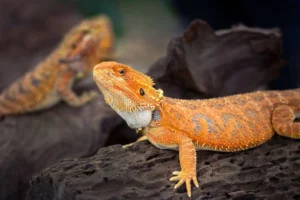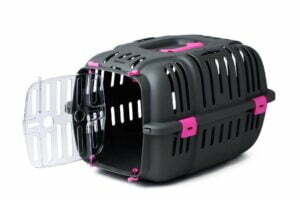Last Updated on 11 months ago by Nicky Johnson
Ensuring a balanced diet for your bearded dragon is crucial for its health and longevity. These pets require a diet that mirrors their natural food sources found in the wild. This guide will explore whether your bearded dragon can safely consume nightcrawlers, also known as earthworms, and how they can fit into a healthy diet for your pet.
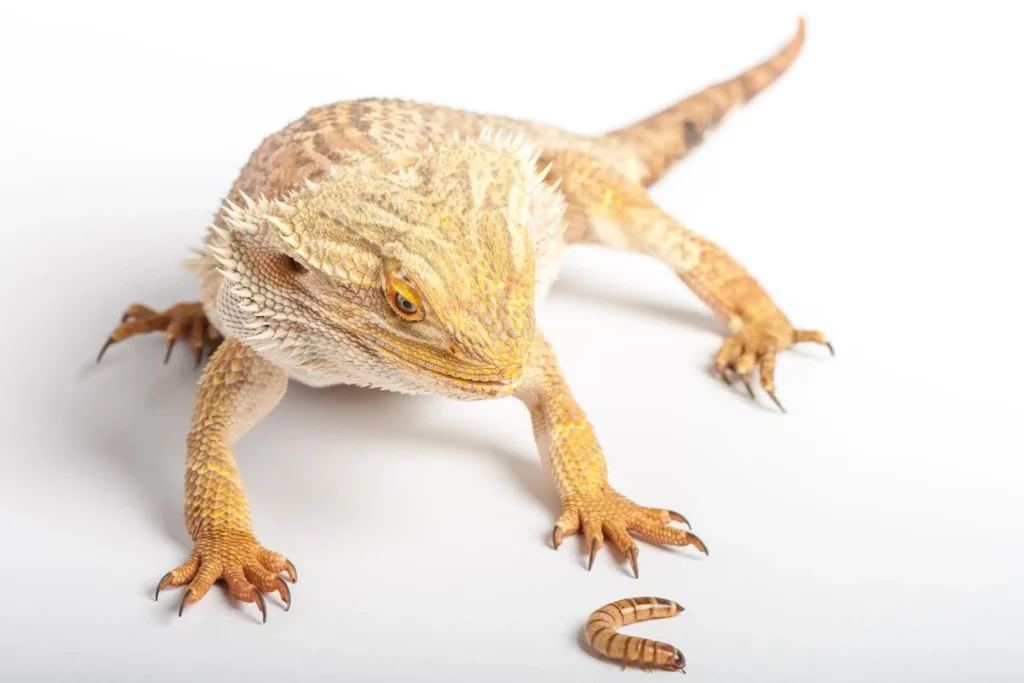
Introduction to Bearded Dragon Diet
Blog Contents
A bearded dragon’s diet in the wild mainly consists of insects, vegetables, and fruits. Ensuring that your pet’s diet meets its nutritional needs is essential for preventing health issues such as obesity and nutrient deficiencies.
Bearded dragons are omnivores, meaning they thrive on a mix of animal and plant-based foods. This varied diet helps them get the necessary proteins, vitamins, and minerals for optimal growth and health. In captivity, their diet should include a balanced mix of protein sources, ample calcium, and various vitamins and minerals.
You may also like: Can Bearded Dragons Eat Plums?
Nutritional Value of Nightcrawlers for Bearded Dragons
Nightcrawlers (Lumbricus terrestris) are a nutritious addition to your bearded dragon’s diet. Known for their high protein content and calcium, they provide significant health benefits. These worms are commonly sold at bait and tackle shops but it’s important to buy them from reputable sources to avoid pesticide contamination.
Nightcrawlers provide:
- 60% protein
- 16% carbohydrate
- 7.8% fat
- 2% fiber
They are rich in essential minerals such as calcium, iron, potassium, magnesium, zinc, and copper. This nutritional profile makes them an ideal protein source and contributor to bone health in bearded dragons.
Health Benefits and Risks of Feeding Nightcrawlers
Feeding nightcrawlers to your bearded dragon can offer numerous benefits:
- Muscle development and repair: High protein content supports muscle growth.
- Bone health: The calcium helps maintain strong bones and prevents metabolic bone disease.
- Digestive health: The soft texture of nightcrawlers makes them easier to digest, reducing the likelihood of digestive issues.
However, there are risks to be aware of:
- Contamination: Some earthworms may carry toxins from pesticides.
- Overfeeding: This can lead to digestive issues and obesity.
- Parasites: Wild-caught worms may carry parasites that can harm your pet.
Proper feeding techniques, such as gut-loading, must be followed to ensure the worms are nutrient-rich and free from harmful substances.
Proper Preparation and Gut-Loading
Before feeding nightcrawlers to your bearded dragon, ensure they are gut-loaded. This process involves feeding the worms nutritious foods like fruits and vegetables for at least 24 hours before offering them to your pet. This ensures that the nightcrawlers are nutrient-dense and provide optimal nutrition.
It is vital to avoid collecting worms from outside, as they may have been exposed to harmful pesticides or parasites.
Optimal Quantity and Alternatives
The number of nightcrawlers you can feed your bearded dragon varies based on their size, age, and appetite. To prevent overfeeding and subsequent health issues, it is recommended to start with a few small earthworms and gradually adjust based on your pet’s response.
Baby bearded dragons should start with smaller insects like small mealworms or crickets. As they grow, you can diversify their diet to include larger prey items like nightcrawlers.
Adult bearded dragons can handle larger prey, but it’s crucial to monitor their weight and overall health to avoid obesity. A general guideline is to feed around 20 to 60 earthworms per week, spread out over meals.
In addition to nightcrawlers, there are several other nutritious items you can offer:
- Dubia roaches: Nutrient-dense with a good calcium-to-phosphorus ratio.
- Crickets: Readily available and easy to gut-load.
- Superworms: Should be provided sparingly due to their high fat content.
Can bearded dragons eat nightcrawlers?
Feeding wild earthworms or nightcrawlers to your bearded dragon can be risky. These worms might carry parasites or be exposed to harmful pesticides. It is essential to source worms from reputable suppliers who ensure that their products are pesticide-free and safe.
Feeding nightcrawlers in moderation as part of a varied diet can be beneficial. However, remember that too many worms can lead to health issues, including potential toxicity.
How many Nightcrawlers can a bearded dragon eat?
The number of nightcrawlers your bearded dragon can eat depends on several factors, including its age, size, and activity level. Overfeeding can lead to digestive issues and obesity, so it’s essential to monitor and adjust based on your pet’s response.
Baby Bearded Dragons
- Quantity: Small earthworms or 2-3 small pieces of nightcrawler
- Frequency: Twice a week
- Monitor for: Digestibility and growth
Adult Bearded Dragons
- Quantity: 20 to 60 nightcrawlers per week, spread out over multiple meals
- Frequency: 2-3 times a week
- Monitor for: Weight, activity level, and overall health
When introducing nightcrawlers into your bearded dragon’s diet, start with small amounts and gradually increase based on how well your pet tolerates them. Make sure the worms are gut-loaded and free from pesticides or other contaminants.
- High Protein: Supports muscle development
- Calcium: Essential for bone health
- Digestibility: Soft texture aids in digestion
Maintaining a balanced diet by combining nightcrawlers with other nutritious insects and plant-based foods ensures your bearded dragon receives all the necessary nutrients. Always consult with a reptile veterinarian if you have any concerns regarding your pet’s diet.
Can Bearded Dragons Eat Wild Worms?
Feeding wild earthworms or nightcrawlers to your bearded dragon can be risky. These worms might carry parasites or be exposed to harmful pesticides. It is essential to source worms from reputable suppliers who ensure that their products are pesticide-free and safe.
Feeding nightcrawlers in moderation as part of a varied diet can be beneficial. However, remember that too many worms can lead to health issues, including potential toxicity.
Can Bearded Dragons eat bait worms and wax worms?
Many wonder if bearded dragons can consume other types of worms like bait worms and wax worms. Yes, these can be included in their diet, especially for baby dragons, but they should not be the primary food source.
Feeding a variety of feeder insects, greens, and vegetables ensures a balanced and nutritious diet. When feeding nightcrawlers or other worms, ensure they are of an appropriate size and have been gut-loaded.
Alternatives to Nightcrawlers for Your Bearded Dragons
If you are looking to diversify your bearded dragon’s diet, consider other options such as:
- Dubia roaches: High in protein and calcium, low in fat.
- Crickets: Easy to gut-load and widely available.
- Superworms: Use as a treat due to their high-fat content.
These alternatives can provide the necessary nutrients without the risks associated with wild-caught prey. A varied diet helps prevent nutrient deficiencies and supports overall health.
Alternatives to Nightcrawlers for your bearded dragons
If you are looking to diversify your bearded dragon’s diet, consider other nutritious options besides nightcrawlers. A varied diet helps prevent nutrient deficiencies and supports overall health.
Dubia Roaches
Dubia roaches are highly recommended due to their excellent nutritional profile. They are rich in protein and have a favorable calcium-to-phosphorus ratio, making them a perfect choice for bearded dragons.
- Calcium content: Balanced
- Fat content: Low
- Ease of digestion: High
Crickets
Crickets are widely available and easy to gut-load. They provide essential nutrients and can be a staple in your bearded dragon’s diet.
- Protein content: High
- Calcium content: Moderate
- Hydration: Good moisture content
Superworms
Superworms should be used sparingly due to their high fat content. They can be given as occasional treats but should not make up the bulk of the diet.
- Protein content: Moderate
- Fat content: High
- Digestibility: Moderate
These alternatives, when properly gut-loaded, offer a well-rounded diet that ensures your bearded dragon remains healthy.
Frequently Asks Questions
Can Bearded Dragons Eat Earthworms?
Yes, bearded dragons can eat earthworms. Earthworms, including nightcrawlers (Lumbricus terrestris), are rich in protein and calcium, making them a nutritious food source. However, it is crucial to ensure that the earthworms are sourced from reputable suppliers and are free from pesticides and parasites. Properly gut-loading the earthworms for 24 hours before feeding ensures they provide optimal nutrition.
How Often Can Bearded Dragons Eat Nightcrawlers?
The frequency of feeding nightcrawlers to your bearded dragon depends on its age and size. Baby bearded dragons should have smaller and more easily digestible insects, while adult bearded dragons can handle larger prey like nightcrawlers. A typical guideline is to feed around 20 to 60 nightcrawlers per week, divided over multiple meals. Always monitor your pet to avoid overfeeding and ensure a balanced diet.
Are Nightcrawlers Good for Bearded Dragons?
Yes, nightcrawlers are good for bearded dragons when included as part of a balanced diet. They provide high protein, essential calcium, and other minerals like iron, potassium, magnesium, zinc, and copper. These nutrients support muscle development, bone health, and overall vitality. However, only use nightcrawlers from reputable sources to avoid any risk of contamination or parasites.
What Insects Should I Avoid Feeding My Bearded Dragon?
Certain insects should be avoided when feeding your bearded dragon due to potential toxicity or nutritional imbalances. Avoid feeding:
- Fireflies: Highly toxic and can be fatal.
- Wild-caught insects: May carry pesticides or parasites.
- Large mealworms: Hard exoskeletons can cause impaction, especially in baby dragons.
- Insects with tough exoskeletons: Difficult to digest and can cause digestive issues.
Stick to safe, gut-loaded insects like crickets, Dubia roaches, and properly sourced nightcrawlers to ensure your bearded dragon’s health.
How Do I Gut-Load Insects for My Bearded Dragon?
Gut-loading insects involves feeding them a nutritious diet to enhance their nutritional value before offering them to your bearded dragon. Here’s how you can do it:
- Provide Nutritious Food: Feed the insects fruits, vegetables, and commercial gut-loading diets specifically designed for feeder insects.
- Timing: Gut-load the insects for at least 24 hours before feeding them to your bearded dragon. This ensures they are filled with nutrients.
- Hydration: Supply a moisture source like water gel to keep them hydrated.
- Proper Storage: Keep gut-loaded insects in a well-ventilated container to avoid overcrowding and stress.
By gut-loading your feeder insects, you can provide a more balanced and nutritious diet for your bearded dragon.
Conclusion
Incorporating nightcrawlers into your bearded dragon’s diet can offer significant nutritional benefits when done correctly. These worms are high in protein and calcium, essential for muscle growth and bone health. However, they should not constitute the entirety of your pet’s diet.
Ensure the nightcrawlers are properly gut-loaded and free from pesticides or other contaminants. Consulting with a reptile veterinarian or nutritionist is highly recommended to ensure that your bearded dragon’s dietary needs are fully met.
For further information on bearded dragon care, refer to these trusted sources:
- Reptile Magazine: Bearded Dragon Care
- Bearded Dragon Care Sheet by Reptiles Magazine
- The Spruce Pets: Bearded Dragon Diet
By following these guidelines and ensuring a balanced, nutrient-rich diet, you can help your bearded dragon thrive.

